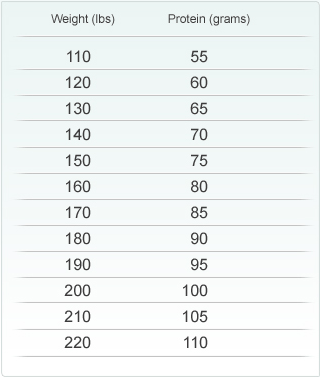Getting enough protein helps your body meet the demands of daily living. And studies show, you probably need more if you are working to build muscle, if you're dieting and as you age. When protein intake is out of whack, it undermines energy, exercise performance and overall health. New research has even found that a protein-rich diet helps to maximize fat loss while minimizing loss of lean body mass. An easy way to estimate your daily protein needs is to divide your current weight in half. The number you get is the amount of protein (in grams) that you should be eating daily.
|
Herbalife Independent Member Blog - Herbalife Independent Member Blog - Daily Protein Needs | ShoptoShape | ShoptoShape
2/5/2012 9:26 AM
Herbalife Independent Member Blog - Herbalife Independent Member Blog - Calorie and Body Weight Basics | ShoptoShape | ShoptoShape
2/5/2012 9:28 AM
Calories Are
- units of energy you body uses to fuel its functions and activities
- created from proteins, fats and carbohydrates found in our foods and beverages
- necessary for basic body functions like keeping the heart, brain and lungs functioning (also know as basal metabolism
- essential to fuel activity – from the smallest hand gesture to a 5-mile run
The number of calories we need each day depends on how much we weigh, how much muscle mass we have and how active we are.
- If you consume more calories than your body needs, those extra calories will be stored as fat.
- If you consume less calories than your body needs, your previously stored calories (fat) will be used to supply additional energy.
A Pound = Approximately 3,500 Calories
To Lose Weight
- By cutting down 500 calories per day, you will cut a total of 3,500 calories per week – resulting in the loss of 1 pound of body fat. But never consume fewer than 1,200 calories per day.* (Refer to Weight Management section for Program.)
- If you want to lose more than 1 pound a week, you will need to either reduce your calorie intake further,* or increase the amount of calories you burn with exercise.
To Maintain Weight
- Balance calories from food and beverages with calories expended.**
If you are a woman:
- You will need about 12 calories for every pound of body weight (A 150-lb. woman needs about 1,800 calories a day.)
If you are a man:
- You will need about 14 calories for every pound of body weight. (A 200-pound man needs about 2,800 calories a day.)
*Source: “Dietary Guidelines for Americans, 2005.” U.S. Department of Health and Human Services, U.S. Department of Agriculture (USDA).
**Source: Dietary Guidelines for Americans, 2005. U.S. Department of Health and Human Services, U.S. Department of Agriculture
Herbalife Independent Member Blog - Herbalife Independent Member Blog - Exercise and Weight Loss: How to make it work? | ShoptoShape | ShoptoShape
3/13/2012 1:23 PM
Even though I’m a dietitian, my clients frequently ask me about exercise as part of their weight loss plan. Since managing weight effectively depends on calorie balance, it makes sense that we talk about not only diet (calories in), but exercise (calories out), too. Most simply want to know how much…or, sometimes, how little…exercise they need to do in order to lose weight, or to keep off weight that they’ve already lost. So here are some of the key things I tell them about exercise and body weight:
- Trying to lose weight through increased activity alone is tough to do. To lose a pound in a week’s time – strictly through exercise – you’d need to burn up an extra 500 calories a day, above and beyond your current activity level. That’s no small task. You’d need to hike uphill for an hour with a 10-pound backpack or swim laps for 90 minutes – without stopping. Trying to lose weightonly through increased activity – or only by cutting your calories – won’t be nearly as effective as a combination of diet and exercise.
- Cutting calories may cause your metabolic rate to drop somewhat. Your metabolic rate represents the number of calories your body burns just to keep basic processes going - and is a big part of your ‘calories out’. But your metabolic rate can dip a little when you cut back on your eating. So even though your ‘calories in’ may be lower, your ‘calories out’ can drop, too – and leave you more or less in calorie balance.
- Strength training can help to increase metabolic rate. When people think ‘exercise’, they usually think aerobic exercise, like biking, swimming or jogging. But strength training is important, too – in part because it helps to build lean body mass, which can bump up your metabolic rate and help offset the drop in calorie burn that takes place when you cut your calories.
- It’s easy to make mistakes when counting calories – both in and out. People tend to overestimate the calorie cost of the exercise they do – and underestimate the number of calories they eat. Which helps explain the frustration many people feel when they’re sure they’re doing ‘everything right’ – but the scale just won’t budge.
- You need a lot of exercise to lose weight, but you need even more to prevent it from coming back. Once you’ve lost it, regular activity is critical when it comes to keeping weight off. But it takes more than a leisurely stroll around the block. Members of the National Weight Loss Registry – people who have lost at least 30 pounds and kept it off for at least a year – burn an average of about 2800 calories a week in exercise. That’s the equivalent of about 90 minutes of exercise – like a briskfour-mile walk – every day.
- Exercise is key to good health and anything is better than nothing. When people hear that they might need an hour or more of exercise a day to keep their weight under control, it can be a little daunting. But don’t let the numbers discourage you. Do what you can, do it regularly, and try to go a little farther – or work out a little harder – each time.
Written by Susan Bowerman, MS, RD, CSSD. Susan is a paid consultant for Herbalife.






